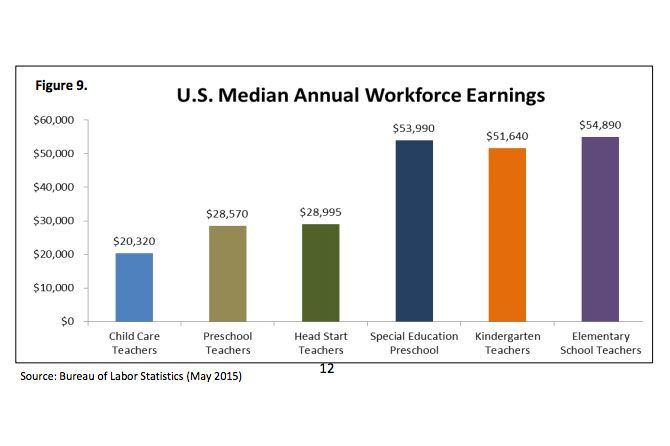
It’s a well-known fact in teaching circles, but one that parents of young children are often surprised to find out: Preschool teachers, those who care for our youngest children, make far less money on average than teachers of kindergarten and upper elementary grades.
On Tuesday, a new report released by the Obama administration as part of the White House’s United State of Women Summit about preschool teachers suggested that low pay can “undermine the quality” of education.
The report draws on research from the Bureau of Labor Statistics, which found that 64 percent of mothers with children under the age of 6, and 58 percent of mothers with children under the age of 1, work. This means, of course, that many children are in preschool at a younger age than ever before. The report’s approach suggests that these early education years — from infancy to 4 years old — are also some of the most important. The “first five years,” the report reads, and “in particular the first three have the greatest potential for setting a strong foundation for lifelong learning and health.” In other words, the report accepts the reality that in most families, both parents (if indeed there are two) need to work, and these are opportune years for children to learn a lot in school, anyway. So far, so good, right?
The problem is, of course, that though preschool is quite expensive, educators working in preschool settings make a lot less than teachers of older children. This is partly because not all preschools require a bachelor’s degree for their teachers. But that isn’t the whole story: “[M]any individuals within the early learning workforce earn low wages sometimes at or near the Federal poverty line even when they obtain credentials and higher levels of education.” In fact, the wage gap is really stark. The report finds that “[t]hose who work with children under age three, earn on average about 70 percent of the hourly wage of those working with children ages 3-5,” which translates on average to more than $8,000 less per year.
Over the past few years, because of the recognized importance of preschool for young children, more 4-year-olds than ever are now enrolled, and emphasis has been placed on requiring teachers to be well-educated. Today, “45 percent of all preschool teachers working with children age 3-5 across the United States have Bachelor degrees. Although degree requirements and attainment have increased, wage parity has not,” the report says.
Low pay, of course, makes it harder to attract talented teachers, and it makes it hard to retain the good ones. Plus, pay for all teachers of young children is low, with teachers in many states averaging numbers below the federal poverty line, making them eligible for public assistance. Preschool teachers, it found, earn less than half as much as kindergarten teachers, in 13 states. Ninety-seven percent of early childhood educators are women, many with children themselves.
This is an incredibly horrible state of affairs, and one that is a touchy subject for many working parents: We want high quality child care and education for our children while we work, but we need it to be affordable enough that working isn’t a lost cause, budgetwise. But, especially in private preschool settings, the lower the cost per child each parent pays, the lower the wages for teachers. The report states that the Department of Education’s goals moving forward are to achieve pay parity for early childhood educators equal to that of kindergarten teachers, and to provide pathways to professional development and education for them as well. Fingers crossed.


